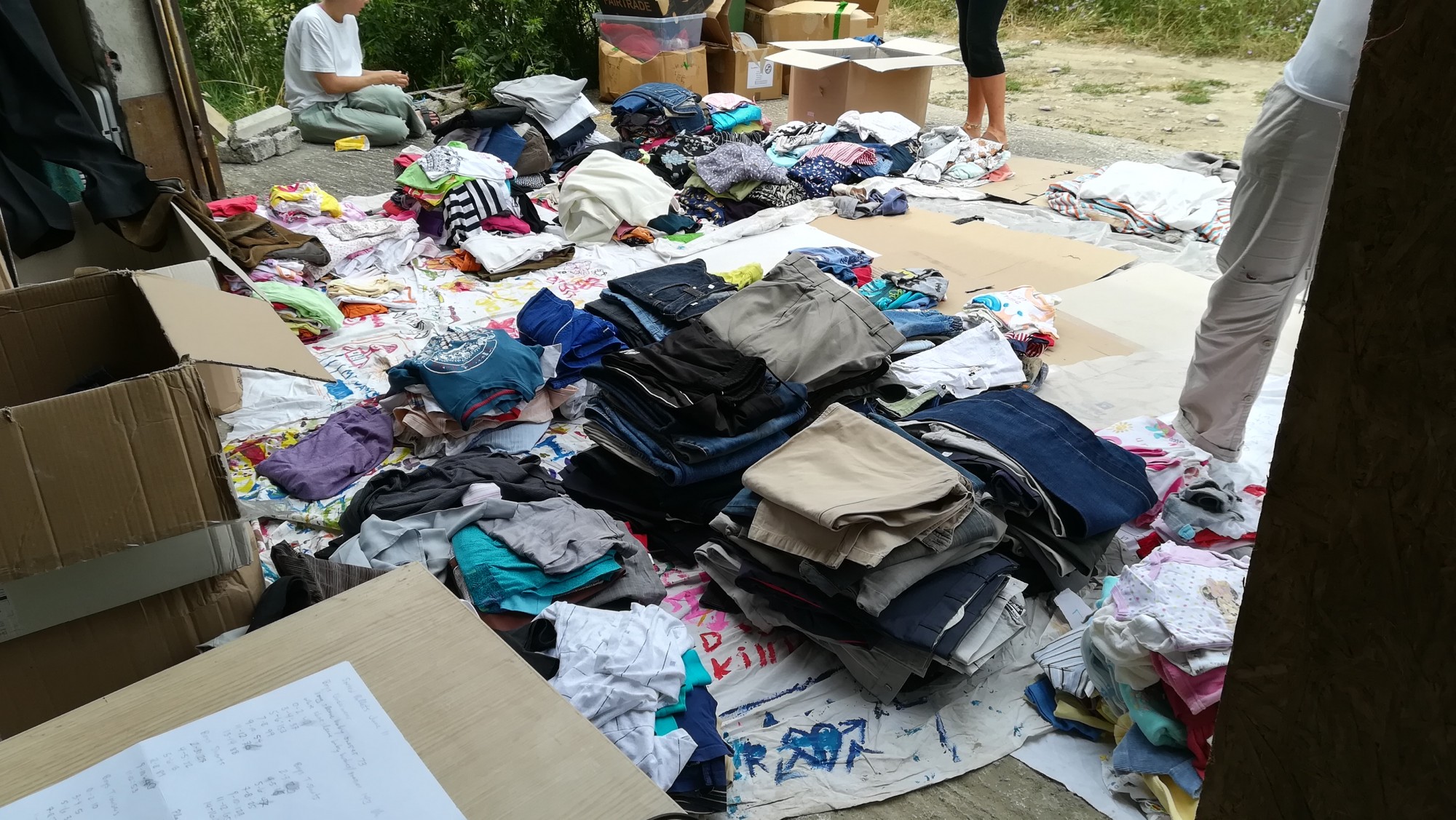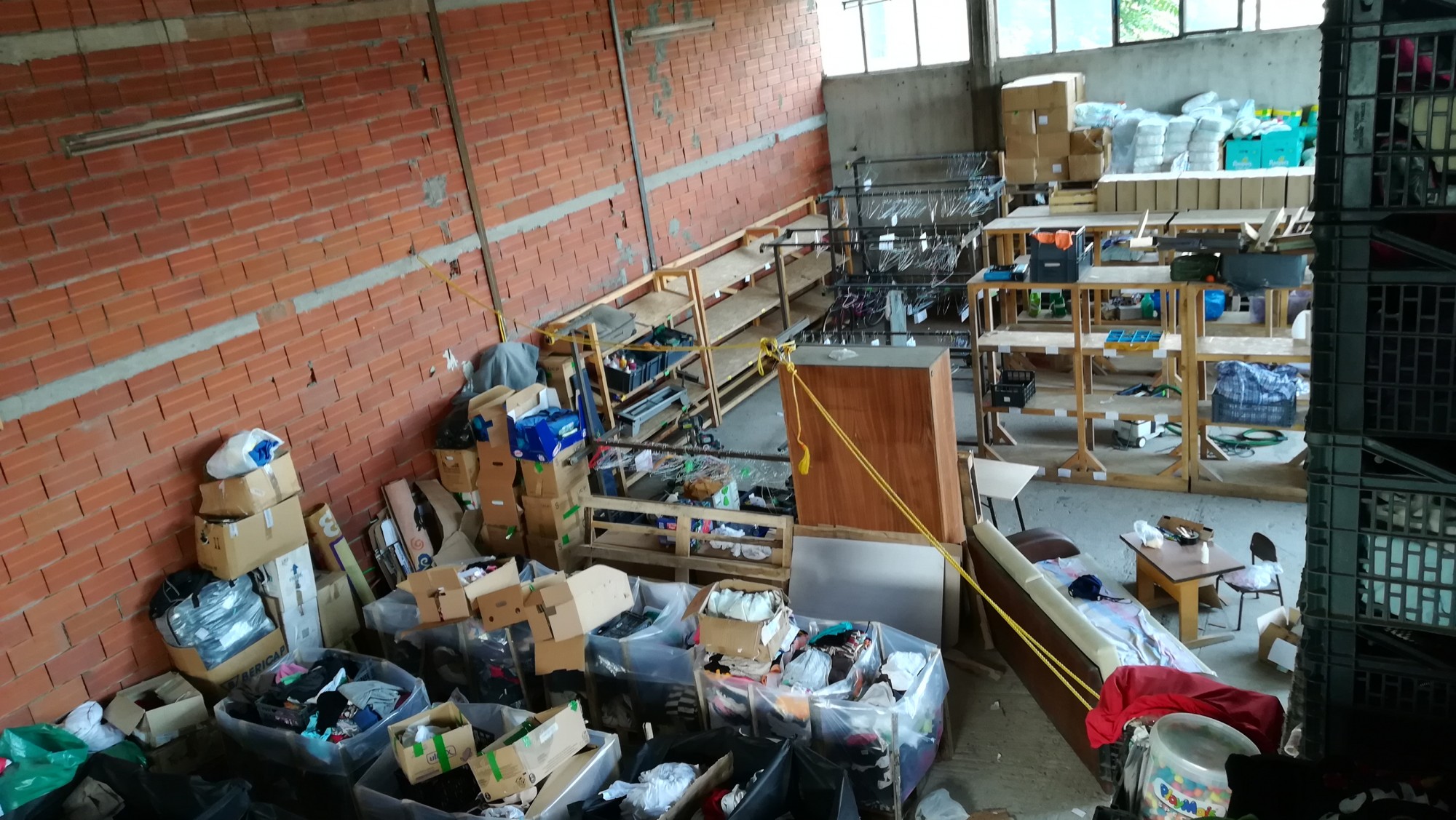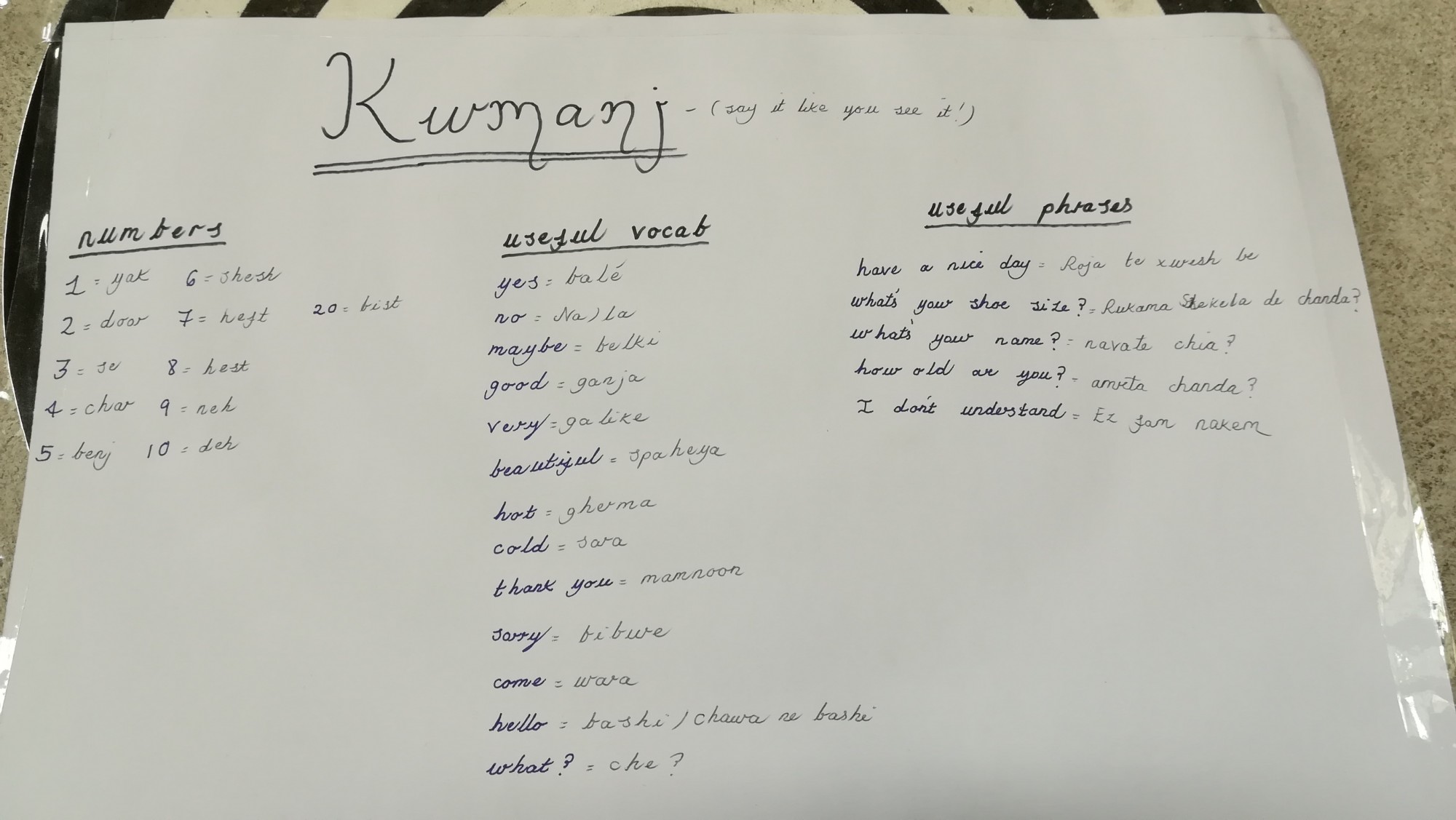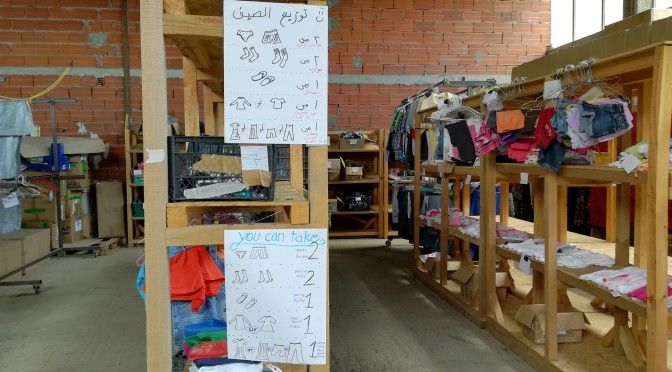I pick up a little white dress with red polka dots, and imagine a toddler spinning around in it. I lay it in the girls’ 0-2 years-old pile.
Next out of the box is a Spiderman t-shirt. I hold it up and think of my nephews. Would it fit my four-year-old nephew or my six-year-old nephew? I decide that it would better fit my older nephew, so I fold it and put in the boys’ 5-6 years-old stack.
Out come a handful of women’s shirts, blouses and pants. They have been washed, ironed and neatly arranged in the cardboard box that arrived this morning from a church clothing drive somewhere in Greece. Their floral prints and chiffon fabric remind me of grandmothers all over Europe; they remind me of the shirts my Croatian grandmother wore in her later years. I hope one of the grandmothers in the camp will find a blouse she likes.
I touch each piece of clothing with respect. I am a small and modest piece in a long chain of events that led to this moment.
My head creates the links. Someone, somewhere, sorted through their closests, and washed and folded what no longer was useful to them. Other people collected the clothes, boxed them up and delivered them to the Lifting Hands International warehouse in Serres, Greece. I send everyone in that part of the chain gratitude for the time they spent and the unknown impact their donation may have.
A team of international volunteers, of which Lluís and I are a part, is re-sorting the clothes into a range of categories and sizes. Girls clothes over here, women’s skirts and dresses go in this bin, little boys’ clothes in this crate, men’s shirts hang on the rack. Some volunteers move boxes of new flip-flops and underwear to wooden shelves in the area of the warehouse that will be transformed into the “shop,” while others count the items and update the inventory records. I watch the group of 20 or so volunteers move with compassion and delibrate focus. I admire the doses of fun they bring to the time-consuming task at hand, smiling and humming songs that someone channeled in from their mobile phone to the speaker sitting on a cluttered table. I wish them continued energy for the good work they do every day.

In the next few days, the 600+ Yazidi refugees living in camp a few kilomters away will come to this warehouse to find a few items of clothing for the summer. Like the clothes they will pick, it has been a long journey for them as well, but a far more traumatic one.
They are from the Shingal area of Iraqi Kurdistan, and have witnessed and lived through things I cannot understand. War, genocide, rape, sex slavery, oppression are a few of the words I have heard the Lifting Hands field coordinators and volunteers say when we asked about the Yazidis. I don’t know how these people reached Serres and what they endured to get here, but I wish them strength to get through whatever life brings them next. Thinking about their journey to this point weighs down my heart, but instead of dwelling on things I can’t change, I pick up another t-shirt and whisper blessings of light and love into its folds.
How Lluís and I ended up in this moment was serendipity’s doing.
Since we began this foot journey in 2016, we knew we wanted in to volunteer with organizations working with refugees, especially those coming to Europe. In the years leading up to our walk, we watched on TV the mass human migration and humanitarian crisis it created so close to home, but we didn’t know then how we could help in a meaningful way. Life has given these migratory people tough cards and forced upon them journeys they had no choice but to take. Somewhere along the way, we hoped that our very different journeys would intersect, and in some way, connect us. Human connection is something we all seek, regardless of how we move through the world. That has proven to be true for us on so many levels as we slowly walk through villages and cities from Thailand to Catalonia.
So when we saw a UN sign on the side of the road we happened to be walking on that said the containers-converted-into-living-units were for migrants and refugees, we hopped the highway dividers, and asked three guys standing outside the complex how we could help. “Go to the school,” they said pointing down the road.
A bit further on, we found the NGO Lifting Hands, which runs a variety of programs for refugees here in Greece and other places where humanitarian aid is in great need. As luck had it, the organization was preparing for its summer clothes drive and needed volunteers to sort and distribute clothing.
Sorting big piles of clothes into smaller piles is a tedious, behind-the-scenes job, and one we embraced. It is a tangible way we could be in service to one of the many communities we have walked through, and a way to pay forward the help we have recieved from other individuals and communities.

It’s a cycle we keep generating as we go. So many people have open-heartedly assisted us in so many ways without expecting anything in return, and now we have a chance to assist others with the same open-heartedness and kindness. Maybe we would meet the refugees, maybe we wouldn’t. That didn’t matter to us. What mattered was simply being there, regardless if we were in the foreground or background.
Being in the warehouse for a few days worked out great for Lifting Hands and for us. They needed extra hands, which we have, and we could participate without making a multi-week or multi-month committment, which the volunteers usually do. Really, serendipity had a hand in how the the synchroncities played out.
Two long days of separating clothes inspires us. After a short side trip by bus to visit Thessaloniki, Greece’s second biggest city, we postpone our walk one more day so we can be in the warehouse for the first day of the planned four-day distribution.
I’m assigned the job of welcoming the refugee residents who are being driven from the camp to the warehouse by a few volunteers, and checking their names on the census list. Lluís stands at the check-out table, ensuring that the residents picked out one shirt, one pair of pants/shorts or a skirt/dress, two pairs of socks, two pairs of underwear and a pair of flip-flops.
“Bashi, hello,” I say first in Kurmanji, the language of the Yazidi people, and then in English, a language Lifting Hands is helping them learn. “Navate chia? What is your name?” One of the volunteers translated a few useful phrases into Kurmanji and hung it on the wall. I scribbled them on my forearm, glancing down at them occasionally as a cheat sheet.

About 230 residents pass through the warehouse that first day. I look into as many of these beautiful Yazidi eyes as possible.
In the adults, I see glimmers of frustration, courage, uncertainty, resignation, expectation, optimism. They wear all of the emotions we collectively share as a species on their faces. They once had their own lives, families, homes, businesses, cars, clothes. Now, thankful to be alive and hopeful for a safe place to start again, they are rummaging through a pile of new underwear and flip-flops knowing that their neighbor will have the exact same color and style as the ones they select. They see themselves as a name on a long list. I see them as champions who keep pressing onwards.
With the teenagers, I look beyond their “I’m too cool to be here” expressions and watch their eyes brighten when they find a shirt in the color they wanted. “Ganja, good,” I say to one of the young men who liked his soccer club shirt. “Spaheya, beautiful,” I tell a young lady who showed me her plaid button-down. I remember folding that shirt, and am glad it’s hers. I send another unspoken blessing to her as she puts the shirt back in the plastic bag.
The eyes of the smallest children carry innocence and surprise. A little girl with crystal clear blue eyes takes my hand, and together we walk towards the bin of flip-flops in her size. She rests her hand on my shoulder as she tries on her pink summer shoes. In her eyes, I witness the purest sense of trust and greatest feeling of friendship. I hope she sees the same thing in my eyes. I hope she will find many more people in her life who look at her the way she looks at me.
In between the hectic moments of welcoming the carloads of arriving families, I pause and look around. It almost makes me cry seeing all these people in the same big room. The human condition sicken me and fascinates me. We do horrible things to each other. We do wonderful things for each other. I find it all incredibly perplexing.
I won’t let the tears come. Not in this moment.
This moment is for dancing. A Yazidi song streams out of the loudspeaker on the table; a glass filled with fresh-cut roses has replaced the clutter that was there a few days ago. A few teenage girls and women put down their shopping bags. They link arms and step in time. I join them, and we move one foot forward, one foot backwards, somehow always managing to inch ahead.
Sometimes that is all we can do. We find a way to keep time with life’s rhythm, and inch ahead however we can.








Your writing about this experience moves me to tears. Best wishes on the next steps of the journey.
Hi
It moved us to tears, too. Humans are such a complex animal. It’s incredible what we do for and to each other…both good and bad. Hugs to you, Jenn
Great story Jenn! The timing of your passing through to help with the huge job was indeed incredible !
Thanks, Nick. We were so lucky to find ourselves there. Thanks to you, too, for making such a big job of clothes sorting fun. Hope our paths cross again somewhere else in the world. Best, Jenn